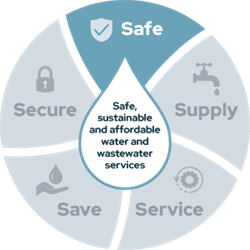Tweed lab and testing services
The Tweed Laboratory Centre (Lab) is a multi-million dollar facility offering a wide range of chemical and biological testing for soil and water.
Whether you're a consultant, developer, local government council, a business or a homeowner, we have laboratory services to meet your needs.
Opened in 1987, the Lab is one of the most established laboratories in the South East Queensland and Northern Rivers region. Our Lab is at the forefront of algae testing and research.
We are a highly experienced technical team and take pride in the quality and integrity of our services. Our exceptional customer service also sets us apart.
We provide transparent guidance in terms of tests that should be undertaken. We will take time to discuss results with you to make sure you get the most from your testing.
Contact us Fees and charges NATA accreditation Frequently asked questions
Contact us
Samples must be received at the Lab by 4:30 pm or extra charges may apply.
Address: 46 Enterprise Avenue, Tweed Heads South, NSW 2486
Fees and charges
The Lab provides a high-quality service at a reasonable price. For a full list of fees and charges see our Services and Price List(PDF, 382KB).
Competitive rates are also available for larger corporate and council clients, contact the Lab directly for details.
Some microbiology testing may attract a surcharge when the incubation period requires staff to come in after hours or at the weekend. To find out if these charges apply, please contact us.
NATA accreditation
The Tweed Laboratory Centre is a National Association of Testing Authorities (NATA) accredited facility for both chemical and biological testing. This means we have stringent processes in place to ensure our day-to-day operations conform to the Australian and International standard AS ISO/IEC 17025.
View the scope of our accreditation at nata.com.au/accredited-facility.
The Lab is regularly audited by NATA. We also carry out regular quality control checks (such as duplicates, internal controls, certified reference material checks and surrogates) and take part in blind sample inter-laboratory proficiency programs.
Frequently asked questions
Why should I test my soil?
Soil testing can provide important information on the condition of soil, including contaminants (for example, heavy metals and pesticides). The Lab offers a variety of soil testing services including contaminant and acid sulfate soil determinations (screening and chromium suite). Contact the Lab to determine the best suite of fit-for-purpose tests.
Why should I test my water?
Your water may contain pathogens, including microbes, fungi or bacteria, which can, in some cases, harm your health. Contaminants may change the taste, odour or appearance of your water. It may stain clothes, harm your appliances (for example, washing machines) and even corrode your pipes.
If you are connected to town water, you can rest easy knowing that Tweed Shire Council regularly tests your drinking water to ensure it is safe. If you are not connected to town water, you may wish to have your water tested regularly.
If you're on the land, then you'll know just how precious your bores, wells, creeks, rivers and farm dams are. Water quality can affect plants, soil, livestock, irrigation equipment and general farm productivity. If you have any doubts about the quality of water you intend to use for irrigation, stock or domestic purposes, you should have it tested.
Swimming pools can also harbour bacteria, algae and other microbes that can not only change the colour of the water but can also cause health issues for swimmers including ear, nose and throat infections. Regularly testing your swimming pool is recommended to ensure that it is healthy and safe to swim in.
Is rainwater safe to drink?
The Tweed's town water supplies remain the most reliable source of safe, quality drinking water for the community. If you have access to town water, NSW Health recommends limiting the use of rainwater to other uses, such as toilet flushing, washing clothes, watering the garden, washing the car, filling swimming pools and firefighting.
Rainwater tanks are generally not recommended for drinking from in urban areas due to traffic and industry emissions that can settle on roofs.
Monitoring your water quality closely will help you to quickly detect potential contaminants, which may pose a risk to your health. Rainwater tanks will need to be cleaned out from time to time. If in doubt, you may want to have your water tested at the Lab.
